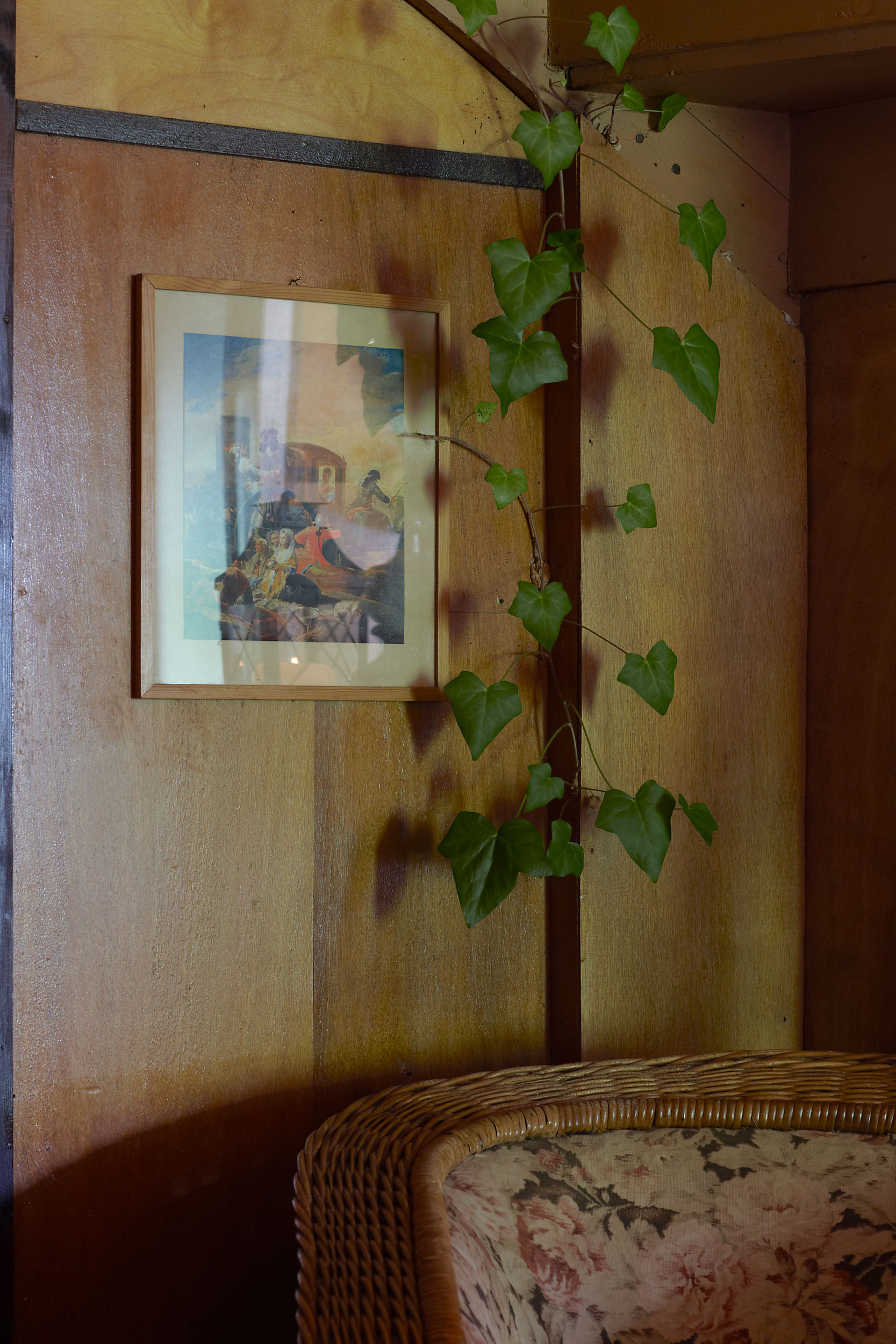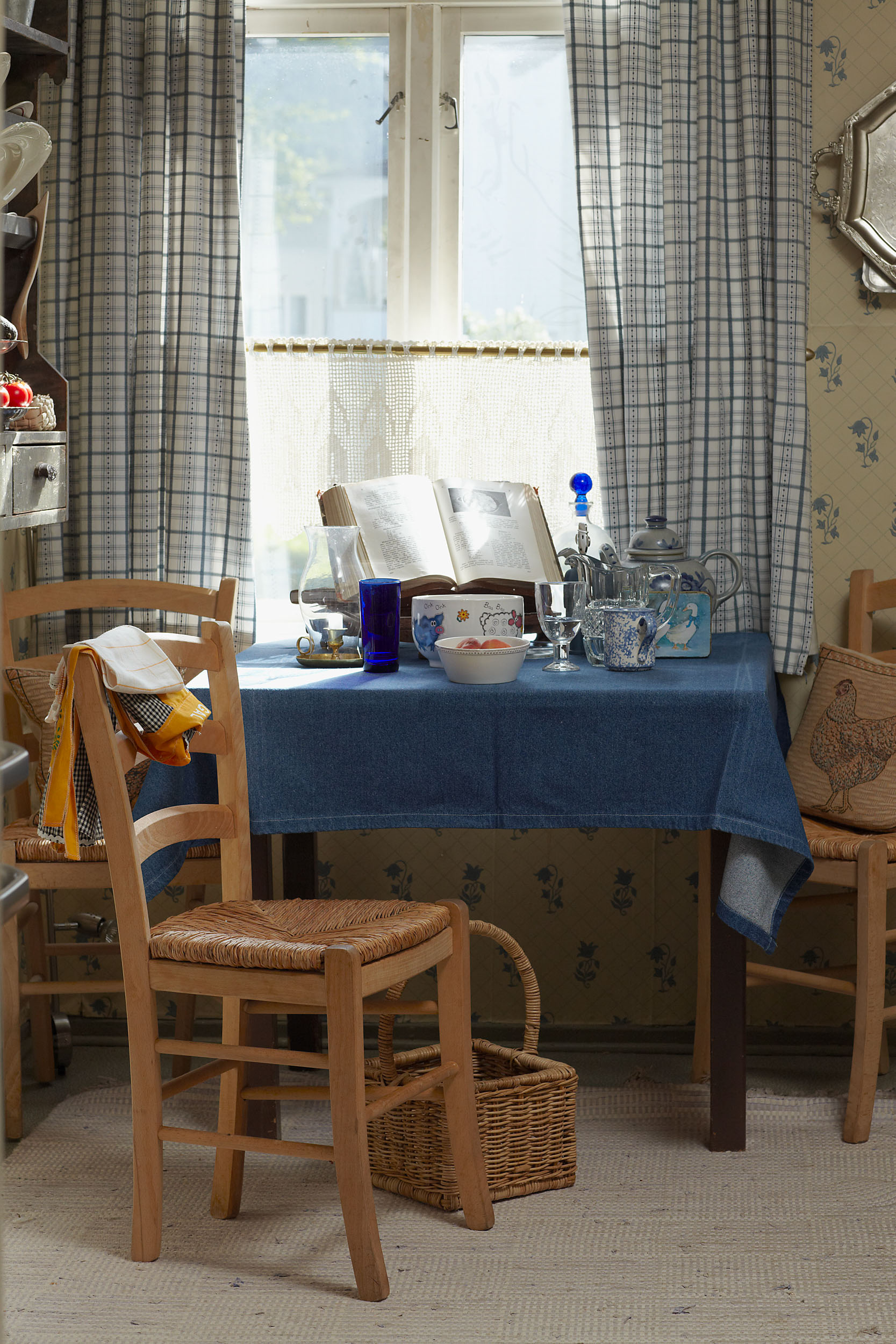An Historical Patchwork. AND The Childhood Home of the Wille Våge sisters
(On endangered buildings in a non-protected cultural landscape)
If we turn the clock back a few decades, the Hjørund Fjord on Norway’s west coast held a similar stature as the Geiranger Fjord does today for international visitors. However, at some point the destination once a favourite among the European aristocracy became enshrouded in the cotton-like fog that on some days engulfs its beautiful landscape.
And yet, a hundred metres or so, just to the right of the ferry dock at Sæbø, stands a proud building, shameless and ready to seduce its guests with history... Or, this was how it appeared in 2011 when The Chromarty visited, knowing that its fate, at that point, was undecided...Now, eight summers on we are unsure of what became of the inside of those wooden structures, the only thing certain is that the eccentric Wille Våge family we met that day, is no longer present. What a shame.
This is how the story was told when we were there…
Once moved in its entirety by Bernt O. Wille from Ålesund, then rebuilt in 1909 as the first house of its kind in Sandvika, the white-painted Villa Wille houses his descendants every summer. His daughter in law Anna Wille spent 30 years alone in the house until 2006 when the next generation returned to take over the maintenance, and in the process, the narrative.
So the story begins here, with the great fire.
Mr Wille was involved in the restoration of Ålesund after the great city- fire. The log buildings were left standing, and the young gentleman took the house to Sandvika in order to raise a family and run a small furniture factory. It was once a quiet fjord regularly hosting the European aristocracy who would stay at the Hotel Union Øye, a little further into the fjord, but that's another ghost’s story ..
His own Hydropower plant
Mr. Wille produced deck chairs, windows and doors for the Coastal Express, but the man was particularly well known for his turning stairs. Most of the furniture in the house was crafted on site. Bernt was a quick-witted, innovative man who took care of business. The house was set up right next to a local waterfall where he promptly set up a water wheel in order to bring the necessary power to the factory. He offered to share the water wheel with the blacksmith next door. Later, building his own hydropower plant on the hillside behind the house, he supplied the neighbourhood with power as well.
Golden glamour dust
There are layers of history in the gleaming panelled walls that greet visitors entering through the hall. These too were produced on site. Worth mentioning apropos of historical interiors and design, -is that the second and third generation of the Wille Våges are also in the field of interior decorating. They have subsequently left their mark on this house of wonders, including the celebrated interior designer Anemone Wille Vaage, who is one of his great-granddaughters. She has resurrected several historical houses in Norway, and even given some of them a touch of her own contemporary golden glamour dust..
Tourist attraction
The workshop on the lower side of the road, down by the waterfront was once a shop called Frølandsbua. The Shed, as the owners call it, is the smallest house on the property and served as storage space. Today it’s a combination of a boathouse and gazebo where the family Wille Våge can sit late into the night with good food and drinks, enjoying lofty conversations and classical music turned all the way up ... Dressed in flowing robes and bright colours, they are almost a tourist attraction in themselves, as people passing through the yard catch a glimpse of them eating breakfast down by the water around noon..
The women enter
Bernt’s granddaughter Svanhild, who has the primary responsibility for the many-faceted property, lives there in the extended summer months. Her mother was a very generous woman, letting her daughter and three granddaughters, - Anemone, Synnøve and Pernille (all well known designers in each their field) - gradually enter and take over the operations in the kitchen, and then partially renovate some of the surfaces within the house! The rest has been left exactly the way it’s always been, both in the workshop and in the main house where all the furniture is still well preserved. With Anemones ability to create seductive interiors as if from another time, they've managed, by simple means, to make the old place not just more functional, but alive with its original spirit. Like the ivy that creeps out of drawers and cupboards, its roots set deep in the basement, the place is reminiscent of a scene from Alice in Wonderland, or a kind of well-kept Grey Gardens.
Mother Svanhild, a trained upholsterer working mainly with interiors, also had a sewing boutique in Oslo and has done wonders for Villa Wille. She chooses contemporary fabrics, has darned the old furniture, sewn curtains and tablecloths, bed skirts and blankets and stitched pillows. And yet, despite all this revamping, it’s as if the place has always looked exactly as it does now. Even recently added textiles seem to acquire a certain patina in the photographs.
A great summer’s day with the Wille Våges
So, what is a typical on-season day for the family up here? Pernille Vaage eagerly explains:
- The most important question of any day is, what to eat? What do we have, what needs to be picked up from the local store? Can we fish today? Where to eat, how many for dinner? Which table to use, which tablecloth and which china? As long as our younger brother Martin is on here, we’re safe. Then we can just concentrate on getting the table ready. He spends much of the day fishing, then the rest of the day in the kitchen. She laughs when she says that the only problem with this arrangement is the fact that dinner arrives later and later. – Once, dinner wasn’t served until midnight. ‘Granny, though old, laughed and said that they used to eat dinner at 12 o’clock in the old days as well! Pernille goes on to describe the family’s focus on meals during these holidays.
- Setting a table down by the sea is of course preferred. The combination of a sublime meal, a cold bottle of white wine, good company and the magnificent scenery out here is unbeatable! We bring out our finest china, light candles, and have plenty of blankets and pillows. But, the weather gods aren’t always on our side, so luckily we have several other options. In the boathouse, a table large enough for everyone is always ready, and from in there we even have a beautiful view of the fjord. The shack has a bed as well, so for the tired ones among us, pillows and blankets make it a perfect place for a little nap. If the fog is weighing down upon us from the mountains, we tend to go into the workshop. Over the table we’ve made "chandeliers" from driftwood found on the beach that we've attached lanterns, glass beads and decorative hatches to. We make a nice dinner table with silverware, and linen napkins, get all the candles going, and turn Mozart way up. The room is so rough, and yet evokes certain magic, so we laugh at the thought of what grandfather would say if he saw us sitting there, enjoying a feast on his worktable.
On borrowed time
And still, if we cast our glance away from the fascinating and somewhat decadent holiday habits of this local family, we catch a glimpse of a battle that’s had a unifying effect on them.
The main house on the property, beautiful and intact, complete with plants growing in and through it - is supposedly regulated away in favour of a new and broader ferry-quay, which will render their magnificent view obsolete. Bernt O. Wille’s living legacy is on borrowed time, and the 101-year-old story soon to exist only on paper. The family have fought a long, uphill-battle for this house, arguing that the site is an important part of local culture, but to no avail. They’ve even gone so far as to offer it up as a kind of museum for curious tourists, but no go. Sadly it seems, you cannot halt progress for even a day to allow a tourist or a young student the opportunity to see what life in a real early 1900’s furniture factory would have been like.. And yet they’re hopeful, that in the last hour, the county or someone will give this execution a stay…
….Leaving Sæbø that day was wistful. Though we had a wonderful time with the Wille Våge family whilst documenting the place, we knew when we got on the innocent but feared ferry-vessel that we were most likely never to return. Waving at us from their lawn as we crossed the fjord towards our hotel and the long journey over the mountain, we knew that Villa Wille was to be their second home only a while longer and that the locals would miss them when they were gone. Seldom does a job have such an impact on us...not only because of the story unfolding, but the people involved. Lives lived to its fullest by a charismatic, hardworking and lively group of women captured by us in front of Slogen.. (although we have been informed that there is a brother as well..
AFTER notes:
We now know that the property is being well looked after by Uncle Per Wille. The ferry didn't end up opening it's mouth with all its content arriving in their garden, but lunch is no longer quite the same with 8 metres of wall and noise from engines running right next to you either...
Pernille is currently running her own creative project with Lin Strømsheim www.cardsome.com
Anemone is running Wille Interiør, designing for private clients as well as for hotels abroad.
Synnøve has a styling business , Wille Våge boligstyling.
--
WORDS & PHOTOS: The Chromarty































































